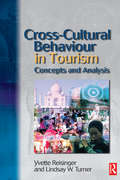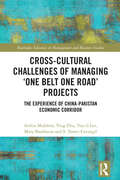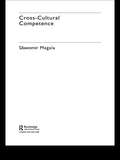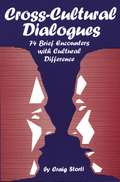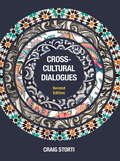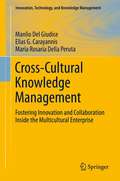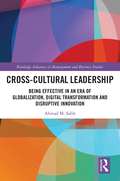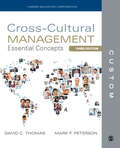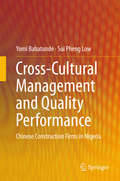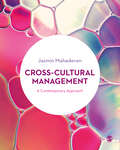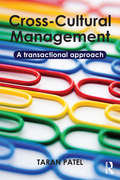- Table View
- List View
Cross-Border Renewable Energy Transitions: Lessons from Europe's Upper Rhine Region (Routledge Studies in Energy Transitions)
by Philippe HammanThis book explores the intrinsically multiscale issue of renewable energy transition from a local, national and transnational perspective, and provides insights into current developments in the Upper Rhine Region that can serve as an international model. Organised around the exploration of stakeholder issues, the volume first describes a framework for public action and modelling and then articulates a triple complementary focus from the viewpoint of law, economics and sociology. This multidisciplinary approach is anchored in the social sciences, but also explores the ways in which technological issues are increasingly debated in the implementation of the ecological transition. With a focus on the Upper Rhine Region of France, Germany and Switzerland, the contributions throughout analyse how concrete regional projects emerge, and whether they are carried out by local authorities, private energy groups, network associations or committed citizens. From this, it appears that real-world energy transition modes can be best understood as permanent transactional processes involving institutional regulations, economic levers and barriers and social interactions. This book will be of interest to advanced students and scholars focusing on renewable energy transition, stakeholder issues, environment and sustainability studies, as well as those who are interested in the methodological aspects of the social sciences, especially within the fields of sociology, law, economy, geography, political science, urbanism and planning.
Cross-Border Valuation
by Kenneth A. Froot W. Carl KesterProvides a review of valuation techniques used to assess cross-border investments. Discusses the discounting of free cash flows with a weighted average cost of capital and the use of adjusted present value. Special concerns such as foreign-exchange risk, country risks, and international diversification are also discussed. Unlike Note on Cross-Border Valuation, this note contains no discussion of valuing real options. A rewritten version of an earlier note.
Cross-Chain Collaboration in Logistics: Looking Back and Ahead (International Series in Operations Research & Management Science #297)
by Frans CruijssenThis book examines cross-chain control centers (4C), an ambitious concept in supply chain management and logistics that is intended to foster collaboration between different supply chains to increase efficiency. It provides an overview of the main results, insights, and other developments in the academic field of horizontal collaboration. Furthermore, it gives recommendations to governments, commercial companies, and academia on how to proceed with horizontal logistics collaboration in the years to come. To link research with practice, the book takes the Dutch project on cross-chain collaboration centers (4Cs) and identifies a typology of existing patterns for horizontal collaboration in supply chains. Finally, the book zooms in on the Netherlands as a case-study of intense public-private partnerships to develop 4C as a mature logistics value proposition. It provides an overview of the accomplishments in the government supported 4C projects and offers a critical reflection of why some more ambitious and structural solutions have not found solid ground yet. The book is of value to researchers and professionals in the supply chain domain.
Cross-Cultural Aspects of Tourism and Hospitality: A Services Marketing and Management Perspective
by Erdogan KocCross-Cultural Aspects of Tourism and Hospitality is the first textbook to offer students, lecturers, researchers and practitioners a comprehensive guide to the influence of culture on service providers as well as on customers, affecting both the supply and the demand sides of the industry – organisational behaviour, and human resource management, and marketing and consumer behaviour. Given the need for delivering superior customer value, understanding different cultures from both demand and supply sides of tourism and hospitality and the impact of culture on these international industries is an essential part of all students’ and practitioners’ learning and development. This book takes a research-based approach critically reviewing seminal cultural theories and evaluating how these influence employee and customer behaviour in service encounters, marketing, and management processes and activities. Individual chapters cover a diverse range of cultural aspects including intercultural competence and intercultural sensitivity, uncertainty and risk avoidance, context in communication, power distance, indulgence and restraint, time orientation, gender, assertiveness, individualism and collectivism, performance orientation, and humane orientation. This book integrates international case studies throughout to show the application of theory, includes self-test questions, activities, further reading, and a set of PowerPoint slides to accompany each chapter. This will be essential reading for all students, lecturers, researchers and practitioners and future managers in the fields of Tourism and Hospitality.
Cross-Cultural Aspects of Tourism and Hospitality: A Services Marketing and Management Perspective
by Erdogan KocCross-Cultural Aspects of Tourism and Hospitality offers a comprehensive guide to the influence of culture on customers as well as service providers, affecting both the demand and the supply sides of the industry – services marketing and consumer behaviour, management, organisational behaviour, and human resource management.This book takes research-based approach, critically reviewing the findings of papers on cross-cultural aspects of tourism and hospitality and how these influence the attitudes and behaviours of the customer (e.g., a tourist or a guest), employee, and the manager. Individual chapters provide a diversified perspective to include intercultural competence and intercultural sensitivity, uncertainty avoidance and risk aversion, context in communication, power distance, indulgence and restraint, time orientation, gender egalitarianism, assertiveness, individualism and collectivism, performance orientation, and humane orientation. This new edition has been updated to include: New content on technological advancements such as the impact of advanced technologies such as AI in general, the generative AI, and service robots, particularly in the context of service encounters and interactions in tourism and hospitality, together with cross-cultural aspects of sustainable tourism. New international case studies throughout to show the application of theory. New problem-solving tasks, chapter takeaways, and checkpoints in each chapter to aid understanding. This will be essential reading for all students, lecturers, researchers and practitioners, and future managers in the fields of tourism and hospitality.
Cross-Cultural Behaviour in Tourism: Concepts And Analysis
by Lindsay Turner Yvette Reisinger, PhDCross-Cultural Behaviour in Tourism: Concepts and Analysis is important reading for those in the following areas of industry: * Tourism: illustrates the importance of cultural background in the tourist experience and how it is a major determinant in repeat visitation * Marketing: provides an understanding of the cultural background of a destination that is vital when formulating successful marketing strategies * Management: provides valuable examples on how cultures influence tourist behaviour and decision-making, helping managers to develop cross-cultural skills and deal with tourists from diverse cultural backgrounds Tourism is a service industry where people from different nationalities meet. In today's international marketplace it is imperative that those in the industry understand the influence of national cultures on their consumers in order to compete successfully for a market share. The book is accompanied by online resources which can be found at www.bh.com/companions/0750656689. These resources include an account of Hypothesis Testing, together with a detailed glossary and a comprehensive reference list of relevant materials.
Cross-Cultural Brand Personality and Brand Desirability: An Empirical Approach to the Role of Culture on this Mediated Interplay (Markenkommunikation und Beziehungsmarketing)
by Corinna Colette VellnagelThis research proposes and empirically tests the impact of brand personality dimensions on brand desirability in a cross-cultural context. Further, the concept of brand-self-congruity is tested on its mediating role between brand personality dimensions and brand desirability. The results reveal that certain brand personality dimensions can have a direct and/ or indirect impact on brand desirability. Yet, this effect mechanism has not only been found to be brand-dependent but also culture-dependent. In this context, the mediating role of brand-self-congruity was confirmed across all cultures and brands investigated. Important implications are derived for research and brand management. In different countries, different brand personality dimensions lead to brand desirability. Therefore, brand managers should know their markets, understand cultural differences and adjust their brand strategy accordingly in order to attain brand desirability.
Cross-Cultural Challenges of Managing ‘One Belt One Road’ Projects: The Experience of the China-Pakistan Economic Corridor (Routledge Advances in Management and Business Studies)
by Ying Zhu You-il Lee Mary Bambacas Arshia Mukhtar S.Tamer CavusgilThe China Pakistan Economic Corridor (CPEC) is a flagship program of China’s ‘One Belt One Road’ initiative, created to boost economic cooperation between China and Pakistan with significant political and economic implications in the region. This book looks at critical issues when developing capabilities of cross-cultural management, adaptation and adjustment through cross-cultural understanding and network building from the CPEC case study. The book highlights the importance of acculturation experience, cross-cultural networking, networking behaviour (guanxi vs. hawala), and factors influencing cross-cultural adjustment, which would enhance the overall performance of ‘One Belt One Road’ projects in general. It looks at how the Chinese and Pakistani employees' national cultures affect their behaviour while working on the CPEC projects. The book offers insights into what cross-cultural adjustments are effective in creating improved individual and organizational performance. In an increasingly globalized world in which the practice of working with people from multiple cultural background is more of a norm, this book will be a useful reference for those who are interested to achieve success in multi-cultural settings.
Cross-Cultural Communication of Chinese Brands
by Jingyun ZhangThis book presents theoretical insights into key aspects of Chinese brand cross-cultural communication, such as psychological distance, implicit context, brand narrative and influence of bridge crowds.This book applies the psychological distance theory of communication to study the psychological distance strategy of cross-cultural communication of Chinese brands from macro and micro perspectives, and proposes to resolve cultural differences by adjusting psychological distance. Based on the above theories,the authors construct the cross-cultural communication strategy model for Chinese brands, in which the following models have been proposed, such as the stages of globalization for Chinese brands, Internationalization of Chinese Enterprises (general as well as several application models).Chapter IX includes five cases studies, including Huawei, CRRC Yongji, COFCO, Yili Thailand and the " Walking Lunar New Year's Eve Dinner" project, which represent four types of brands: high-end equipment, fast moving consumer goods, high technology and cultural activities brand.This book not only provides readers with a broader understanding of brand cross-cultural communication research, but also offers practical suggestions for companies in emerging market countries , especially Chinese enterprises that are undergoing brand globalization.
Cross-Cultural Competence
by Slawomir MagalaCross-cultural management is a crucial challenge for the successful development of international business, yet it is often badly understood and poorly implemented. Misunderstandings arise as culture affects both individuals and organizations, yet attempts to understand, explain and interpret these differences have often been hidden between a welter of conflicting theories and paradigms. This book is a much-needed guide to the theory and practice of cross-cultural management. It focuses on four key areas: the language connection the global connection the management connection the multimedia connection. Using an innovative approach combining theory, tool-kits and applications, it takes a fresh look at this complex topic, investigating the recognition of cross-cultural differences, accounting for them in managerial communications, and bridging them in a variety of negotiations, interactions and collaborative projects.
Cross-Cultural Consumption: Global Markets, Local Realities
by David HowesGoods are imbued with meanings and uses by their producers. When they are exported, they can act as a means of communication or domination. However, there is no guarantee that the intentions of the producer will be recognized, much less respected, by the consumer from another culture. Cross-Cultural Consumption is a fascinating guide to the cultural implications of the globalization of a consumer society. The chapters address topics ranging from the clothing of colonial subjects in South Africa and the rise of the hypermarket in Argentina, to the presentation of culture in international tourist hotels. Through their examination of cultural imperialism and cultural appropriation of the representation of otherness and identity, Howes and his contributors show how the increasingly global flow of goods and images challenges the very idea of the cultural border and creates new spaces for cultural invention. Marian Bredin, Concordia University, Constance Classen, Jean Comaroff, University of Chicago, Mary Crain, University of Barcelona, Carol Handrickson, Marlboro Colleg
Cross-Cultural Dialogues
by Craig StortiCulture affects everything we do: the simplest phrase can be so steeped in cultural context that even seemingly innocent exchanges between people are loaded with cultural differences waiting to expand into misunderstanding and tension. In response, Cross-Cultural Dialogues: 74 Brief Encounters with Cultural Difference offers a collection of 74 brief conversations between an American and people from other cultures, spanning nearly every major region of the world. Each dialogue is categorized as a social, workplace or business interaction and contains at least one breach of cultural norms, which the reader is then challenged to address. Even the most careful reader will be caught off guard by some of the dialogues' hidden subtleties. Storti is meticulous in his analysis of each dialogue, pinpointing not only the moment when the interaction goes wrong, but also identifying the cultural reasons behind each participant's point of view. Whether training others or adding to your own cultural awareness, Cross Cultural Dialogues is an excellent resource, encouraging readers to engage in the world and increase their multicultural understanding.
Cross-Cultural Dialogues: 74 Brief Encounters with Cultural Difference
by Craig StortiCulture affects everything we do: the simplest phrase can be so steeped in cultural context that even seemingly innocent exchanges between people are loaded with cultural differences waiting to expand into misunderstanding and tension. In response, Cross-Cultural Dialogues: 74 Brief Encounters with Cultural Difference offers a collection of 74 brief conversations between an American and people from other cultures, spanning nearly every major region of the world. Each dialogue is categorized as a social, workplace or business interaction and contains at least one breach of cultural norms, which the reader is then challenged to address. Even the most careful reader will be caught off guard by some of the dialogues' hidden subtleties. Storti is meticulous in his analysis of each dialogue, pinpointing not only the moment when the interaction goes wrong, but also identifying the cultural reasons behind each participant's point of view. Whether training others or adding to your own cultural awareness, Cross Cultural Dialogues is an excellent resource, encouraging readers to engage in the world and increase their multicultural understanding.
Cross-Cultural Dialogues: 74 Brief Encounters with Cultural Difference
by Craig StortiHow much culture lurks in common conversation? According to Craig Storti, so much that many of our most common, seemingly innocent exchanges—in social settings, on the job, in the world of business—are cultural minefields waiting to explode. These explosions—cultural misunderstandings—can cause confusion, irritation, even alienation. At the workplace and in the world of business these explosions undermine communication, threaten important relationships, and cost a great deal of time and money; away from work, they strain, even endanger, personal relations. Cross-Cultural Dialogues is a collection of brief conversation (4-8 lines) between an American and someone from another country and culture. Short as each dialogue is, it has buried within it at least one, and usually several breaches of cultural norms which the reader is challenges to figure out. And a challenge it is: the exchanges are so brief and innocuous that even the wariest among us are sandbagged by the dialogue’s hidden subtleties. Ten cultures are represented by the non-Americans in the dialogues: Arab/Middle Eastern, British, Chinese, French, German, Hispanic, Indian, Japanese, Mediterranean/European, and Russian, and the dialogues are grouped according to the setting in which they occur: social, workplace, and business. Whether you’re a learner, trainer, educator, or an armchair interculturalist, you’ll enjoy solving these cultural riddles—and increase your cultural awareness in the bargain.
Cross-Cultural Fashion Marketing: Ethnic Fashion, Diversity and Inclusion (Routledge Studies in the Fashion Industry)
by Satyendra SinghOften neglected by fashion academics, culture underpins diversity and inclusivity of fashion, and more socially aware consumers exhibit ways in which fashion can be displayed within culturally diverse contexts. This book develops an understanding of the role culture plays in fashion and how the fashion industry can embrace diversity and inclusivity in their marketing strategy. The book aims to combine the concept of consumer culture and society with the intricacies of fashion in the context of international marketing, messaging, and communications.With a particular emphasis on ethnic fashion design and distinct features across cultures, it explores theories and concepts relating to modest fashion, beach fashion, headgear fashion and plus-size fashion among others. Each chapter provides fashion-related stimulating activities for experiential learning. Underpinned by theory and supported by practical examples, the book offers an engaging and innovative study of ethnic fashion from cultural perspectives to demonstrate the importance of developing a truly global brand.Cross-Cultural Fashion Marketing is essential reading for scholars and postgraduate students interested in fashion marketing and management, cross cultural management, and consumer culture.
Cross-Cultural Knowledge Management: Fostering Innovation and Collaboration Inside the Multicultural Enterprise (Innovation, Technology, and Knowledge Management #11)
by Maria Rosaria Della Peruta Manlio Del Giudice Elias G. CarayannisCross-cultural knowledge management, an elusive yet consequential phenomenon, is becoming an increasingly essential factor in organizational practice and policy in the era of globalization. In order to overcome culturally shaped blind spots in conducting research in different settings, this volume highlights how the structuring of roles, interests, and power among different organizational elements, such as teams, departments, and management hierarchies (each comprised of members from different intellectual and professional backgrounds), generates various paradoxes and tensions that bring into play a set of dynamics that have an impact on learning processes. In this context, such questions often arise: How is knowledge shared in the multicultural organization? What problems and issues emerge? How do different mentalities affect people's responses to new knowledge and new ideas? How can knowledge-sharing processes be improved? Under which conditions do ideas generated by units or groups of different cultural traditions have a chance of being heard and implemented? Such questions translate into an investigation of potential managerial dilemmas that occur when different but equally valid choices create tensions in decision making. The authors draw from experiences working with a wide variety of organizations, and insights from such fields as sociology and psychology, to shed new light on the dynamics of knowledge management in the multicultural enterprise. In so doing, they help to identify both obstacles to successful communication and opportunities to inspire creativity and foster collaboration. The authors note that in order to enable organizations to transfer knowledge effectively, mechanisms for dispute settlement, mediation of cultural conflict, and enforcing agreements need to be in place.
Cross-Cultural Leadership: Being Effective in an Era of Globalization, Digital Transformation and Disruptive Innovation (Routledge Advances in Management and Business Studies)
by Ahmad M. SalihFor many decades, management in its research and practice has been in need of an alternative approach and paradigm to understanding human behaviours. Many studies and books have attempted to provide solutions to the individual, which ended up being a cultural dilemma with little success. This book provides a novel approach to address this dilemma by linking aspects from three knowledge domains; Psychology, Anthropology and Sociology. Cross-Cultural Leadership supports Cultural Intelligence (CQ) and makes it a practical construct and tool that both managers and researchers harness to understand what "cultural Chameleon" means. The book also renders support to Douglaisan Cultural Framework (DCF) by activating the role of the usually neglected fifth culture; the hermit by linking it to the metacognitive dimension of CQ. This link introduces for the first time the mechanism that individuals use to run through metacognitive processes to drive change. This book is a tool for individuals to help them work efficiently outside their homeland. Being an adaptive or culturally hybrid leader is among the most important competencies of the effective leaders in the 21st century. By focusing on comprehending the five cultures as elaborated in DCF, leaders and managers will be relieved from the dilemma of having to understand each and every national culture of their employees. This book will be of value to researchers, academics, managers, and students with an interest in leadership, management, organization studies, globalization, and innovation
Cross-Cultural Management (Custom CEC Third Edition)
by David C. ThomasCross-Cultural Management: Essential Concepts introduces readers to the fundamentals of cross-cultural management by exploring the influence of culture on interpersonal interactions in organizational settings and examining the ever-increasing number of cross-cultural management challenges that global managers face in today’s workplace. Instead of taking a country specific approach, authors David C. Thomas and Mark F. Peterson offer a predominantly psychological perspective—focusing on the interactions of people from different cultures in organizational settings. This approach shows readers the effects culture has on a wide variety of cross-cultural interactions across organizational contexts.
Cross-Cultural Management and Quality Performance: Chinese Construction Firms in Nigeria
by Sui Pheng Low Yomi BabatundeThis book explores China's global competitiveness in the building of infrastructures with a particular interest in the resource-rich African countries. The book begins with a comprehensive literature review on total quality management (TQM) and national culture, followed by reviews of the construction industries in China and Nigeria. This provides better understanding of the linkages between TQM, based on the International Organization for Standardization's ISO 9000 quality management systems (QMS), and national culture, based on Emeritus Professor Geert Hofstede's national cultural dimensions. Premised on the culture-specificity and bi-directionality relationships between TQM and national culture, this book investigates the construction industries in China and Nigeria including their strengths, weaknesses, opportunities, and threats (SWOT) as well as an appraisal of their historical and emerging relationships. In its conceptual approach, this book presents different models in the lead up to its primary theoretical contribution of a quality management assessment model (QMAM) that was adopted during the study's field work. The book also presents relevant lessons relating to cross cultural management and quality performance not only to the Nigerians but also other foreign players in Nigeria's construction industry.
Cross-Cultural Management: A Contemporary Approach (Routledge Studies In International Business And The World Economy Ser. #1)
by Jasmin MahadevanThis timely textbook is contemporary and comprehensive in its coverage of Cross-Cultural Management, and unique in its approach which fosters a multi-paradigmatic mindset among readers; embraces problem-based and experiential learning; and acknowledges the many diverse identities of cross-cultural managers. Part I provides an overview on how Cross-Cultural Management emerged and why it is unique, and Part II integrates the functionalist, interpretive and critical perspectives underpinning it. Part III transfers this learning to areas of application, including international business, organizations, technology and social media, and Part IV focuses on key skillsets such as developing your managerial competencies and designing your own research. Each chapter is brought to life via an opening case study, and readers are invited to complete a variety of activities throughout chapters. Afterwards, the opening case is revisited, and a closing activity introduces the next area of learning. This textbook is essential reading for higher education students, educators and researchers alike, and will also be of interest to business and management practitioners. It can be used as a central text for university and college courses on and related to Cross-Cultural Management, International Business and general intercultural competencies. Jasmin Mahadevan is a Professor of International and Cross-Cultural Management at Pforzheim University, Germany.
Cross-Cultural Management: A Contemporary Approach (Routledge Studies In International Business And The World Economy Ser. #1)
by Jasmin MahadevanThis timely textbook is contemporary and comprehensive in its coverage of Cross-Cultural Management, and unique in its approach which fosters a multi-paradigmatic mindset among readers; embraces problem-based and experiential learning; and acknowledges the many diverse identities of cross-cultural managers. Part I provides an overview on how Cross-Cultural Management emerged and why it is unique, and Part II integrates the functionalist, interpretive and critical perspectives underpinning it. Part III transfers this learning to areas of application, including international business, organizations, technology and social media, and Part IV focuses on key skillsets such as developing your managerial competencies and designing your own research. Each chapter is brought to life via an opening case study, and readers are invited to complete a variety of activities throughout chapters. Afterwards, the opening case is revisited, and a closing activity introduces the next area of learning. This textbook is essential reading for higher education students, educators and researchers alike, and will also be of interest to business and management practitioners. It can be used as a central text for university and college courses on and related to Cross-Cultural Management, International Business and general intercultural competencies. Jasmin Mahadevan is a Professor of International and Cross-Cultural Management at Pforzheim University, Germany.
Cross-Cultural Management: A Transactional Approach
by Taran PatelThe internationalization of business via the process of globalization has brought issues of culture to the forefront of management thinking. Although culture is by no means a new area of study in business schools, it remains frustratingly elusive and misunderstood. This textbook gives business students - or future managers - an understanding of the multitude of frameworks available to them to make sense of the cultural contexts they will encounter in their managerial careers. Starting from a general introduction to ‘culture’ and its role in businesses, Taran Patel encourages readers to shed a critical eye on the commonly accepted frameworks. She compels readers to ask three questions: Can I only make sense of the variety of cultures around me by categorizing people into static categories based on their geo-ethnic identities? Is it valid to make sense of people’s behaviours by categorizing them as ‘French’, ‘Indian’, ‘German’ or ‘American’? What other ways are there to make sense of people and their behaviours? Students studying from this textbook will benefit from a variety of conceptual tools that can be used to navigate the world of culture and its intersection with business and management. Taran Patel's unique textbook will be core reading for students of cross-cultural management / intercultural communication and essential reading for all those studying or researching international business and management.
Cross-Cultural Management: An Introduction
by David C. Thomas J. H. InksonCross-Cultural Management: An Introduction offers students a hands-on approach to cross-cultural management that they can apply to a wide variety of organizational contexts. Rather than focusing on specific countries, authors David C. Thomas and Kerr Inkson highlight the interactions of people from different cultures in organizational settings to provide students with practical applications of concepts in international management. Real-world examples and case studies help students understand and integrate differences between attitudes, values, beliefs, and assumptions so that they can thrive as managers.
Cross-Cultural Management: An Introduction
by David C. Thomas J. H. InksonCross-Cultural Management: An Introduction offers students a hands-on approach to cross-cultural management that they can apply to a wide variety of organizational contexts. Rather than focusing on specific countries, authors David C. Thomas and Kerr Inkson highlight the interactions of people from different cultures in organizational settings to provide students with practical applications of concepts in international management. Real-world examples and case studies help students understand and integrate differences between attitudes, values, beliefs, and assumptions so that they can thrive as managers.
Cross-Cultural Management: Culture and Management across the World
by Jean-François Chanlat Eduardo Davel Jean-Pierre DupuisAll cultures appear to share the belief that they do things ‘correctly’, while others, until proven otherwise, are assumed to be ignorant or barbaric. When people from different cultures work together and cannot take shared meanings for granted, managers face serious challenges. An individual’s parsing of an experience and its meaning may vary according to several cultural scales – national, professional, industrial and local. Awareness of cultural differences and the willingness to view them as a positive are therefore crucial assets. This edited textbook sets itself apart from existing cross-cultural management texts by highlighting to the reader the need to avoid both ethnocentrism and the belief in the universality of his or her own values and ways of thinking: the success of international negotiations and intercultural management depends on such openness and acceptance of real differences. It encourages the development of ‘nomadic intelligence’ and the creative use of a culture’s resources, according to a symbolic anthropology perspective. Through the essays and case studies in the chapters, readers will become aware of the intercultural dimension of business activities and better understand how they affect work. Cross-Cultural Management will help interested parties – students of business management, international relations and other disciplines, and business managers and other professionals – develop their ability to interact, take action and give direction in an intercultural context.





